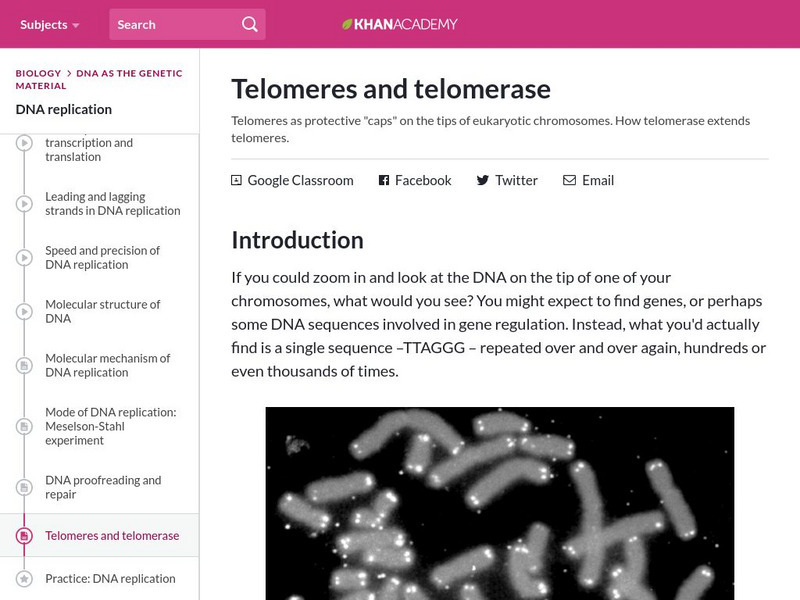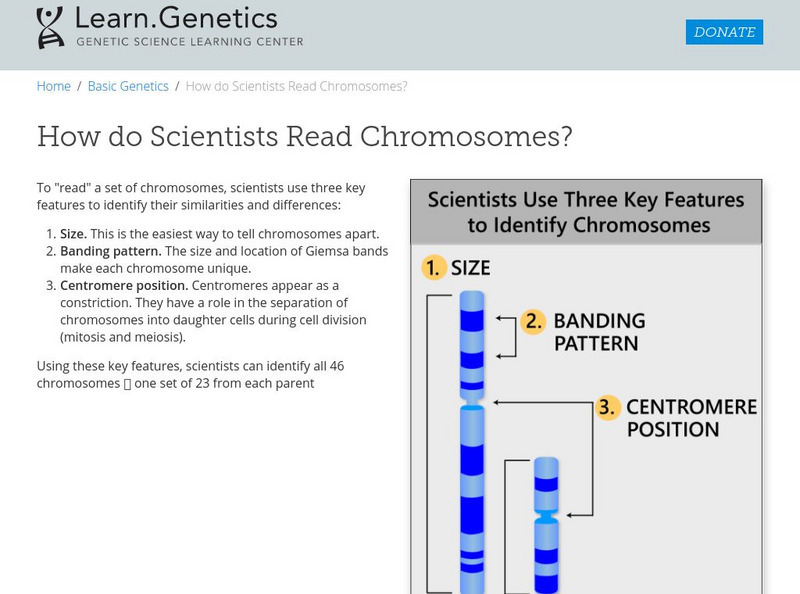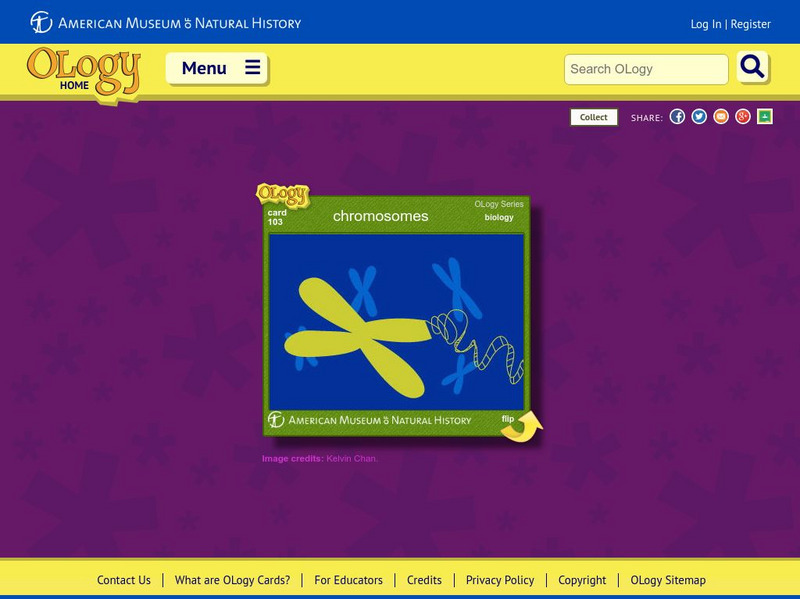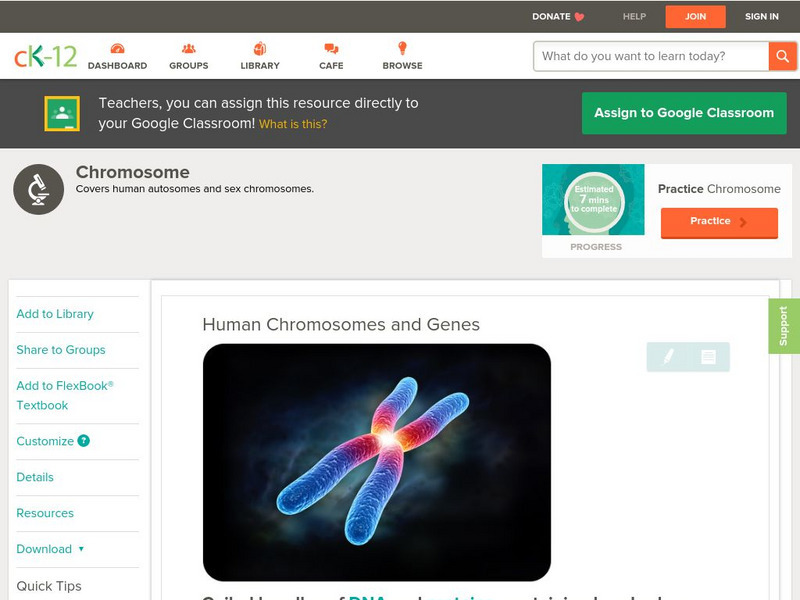National Health Museum
Access Excellence: Genes
Access Excellence offers an explanation of genes is supplemented with an illustration of the placement of genes in a chromosome.
National Health Museum
Access Excellence: Human Chromosomes
This map from Access Excellence shows human chromosome pairs. The site includes a short description of chromosome structure, staining of chromosomes and karyotypes.
Oak Ridge National Laboratory
Genome Project Information Archive
This reosurce from the Human Genome Project of the Oak Ridge National Laboratory (ORNL) provides links to all the information you ever wanted to know regarding the Human Genome Project.
Other
Human Genome Sequencing Center (Baylor College of Med)
Resource presents information about the human genome sequencing project and has links to other genome projects besides the Human Genome Project.
Biology 4 kids
Biology4 Kids: Chromosomes Pull Up Those Genes
Read about how the genetic information in a cell is organized in the nucleus.
Khan Academy
Khan Academy: Aneuploidy & Chromosomal Rearrangements
Find out about aneuploidy and nondisjunction, as they relate to down syndrome and other related disorders. Also learn about chromosomal rearrangements.
Khan Academy
Khan Academy: Telomeres and Telomerase
See how telomeres act as protective "caps" on the tips of eukaryotic chromosomes. Also learn how telomerase extends telomeres.
University of Utah
University of Utah: Learning Center: learn.genetics: Scientists Read Chromosomes
Find out how scientists read human chromosomes using three features: size, banding pattern, and centromere position.
CPALMS
Florida State University Cpalms: Florida Students: The Story of Our Start
Learn how offspring are created through the processes of sexual and asexual reproduction.
CPALMS
Florida State University Cpalms: Florida Students: Yes or No to Gmo?
Discover the purpose of genetic engineering in agriculture. Explore the pros and cons of genetic modification.
Famous Scientists
Famous Scientists: Thomas Hunt Morgan
A short biography of the Nobel Prize in Physiology or Medicine in 1933 for discoveries elucidating the role that the chromosome plays in heredity.
TeachEngineering
Teach Engineering: Heredity Mix 'N Match
This site includes a lesson plan designed to teach students how genetic traits are passed down from parents to offspring. Students will explore such concepts as random selection, chrosomes, genotypes and phenotypes using jelly beans and...
CK-12 Foundation
Ck 12: Biology: Chromosomes
[Free Registration/Login may be required to access all resource tools.] An introduction to chromosomes.
American Museum of Natural History
American Museum of Natural History: Chromosomes O Logy Card
Flip this interactive card to start learning about chromosomes, tiny, spaghetti-like packages of information. Answer multiple-choice and fact-or-fiction questions and review some fast facts about chromosomes.
Nobel Media AB
The Nobel Prize: The Nobel Prize in Physiology or Medicine 1933
At this site from The Nobel Foundation you can read about Thomas Hunt Morgan, the scientist who won the Nobel Prize in Medicine "for his discoveries concerning the role played by the chromosome in heredity." This website is organized...
Read Works
Read Works: Two Sets to Build Difference
[Free Registration/Login Required] An informational text about Charles Darwin's research on trait variations in the Galapagos Islands. A question sheet is available to help students build skills in reading comprehension.
CK-12 Foundation
Ck 12: Biology: Cell Nucleus
[Free Registration/Login may be required to access all resource tools.] Covers the structure and function of the nucleus.
CK-12 Foundation
Ck 12: Life Science: Mitosis and Cytokinesis
[Free Registration/Login may be required to access all resource tools.] During mitosis, the DNA in a nucleus must replicate. The copied DNA is divided into two genetically identical sets, so that after cytokinesis or cell division, each...
CK-12 Foundation
Ck 12: Biology: Human Chromosomes and Genes
[Free Registration/Login may be required to access all resource tools.] Covers human autosomes and sex chromosomes.
PBS
Pbs Teachers: Cracking the Code: Explore a Stretch of Code
Investigate the makeup and function of genes and genetic code by exploring an actual stretch of human DNA in this activity.
Estrella Mountain Community College
Estrella Mountain College: Cell Division and Meiosis
Resource provides a holistic and complete meiosis lesson with illustrations, animations, glossary, and links. Extremely detailed and helpful site.
Other
Lawrence Livermore National Lab: Probabilities of Traits
This site explains how to determine the chances of inheriting certain traits from our parents. It gives mathematical examples and exercises.
National Cancer Institute at the National Institutes of Health
National Cancer Institute: What Are Gene Mutations?
This website provides an answer to the following question: "What are Gene Mutations?" Many links are provided throughout this short description that access information on related subjects.
Bryn Mawr College
Serendip: Dragon Genetics: Independent Assortment and Gene Linkage
Brief text summary of what students learn in the Dragon Genetics I lab along with links to download Student Handouts and Teacher Preparation Notes in PDF and Word formats. Multiple gene inheritance and the cause of genetic linkage are...





















